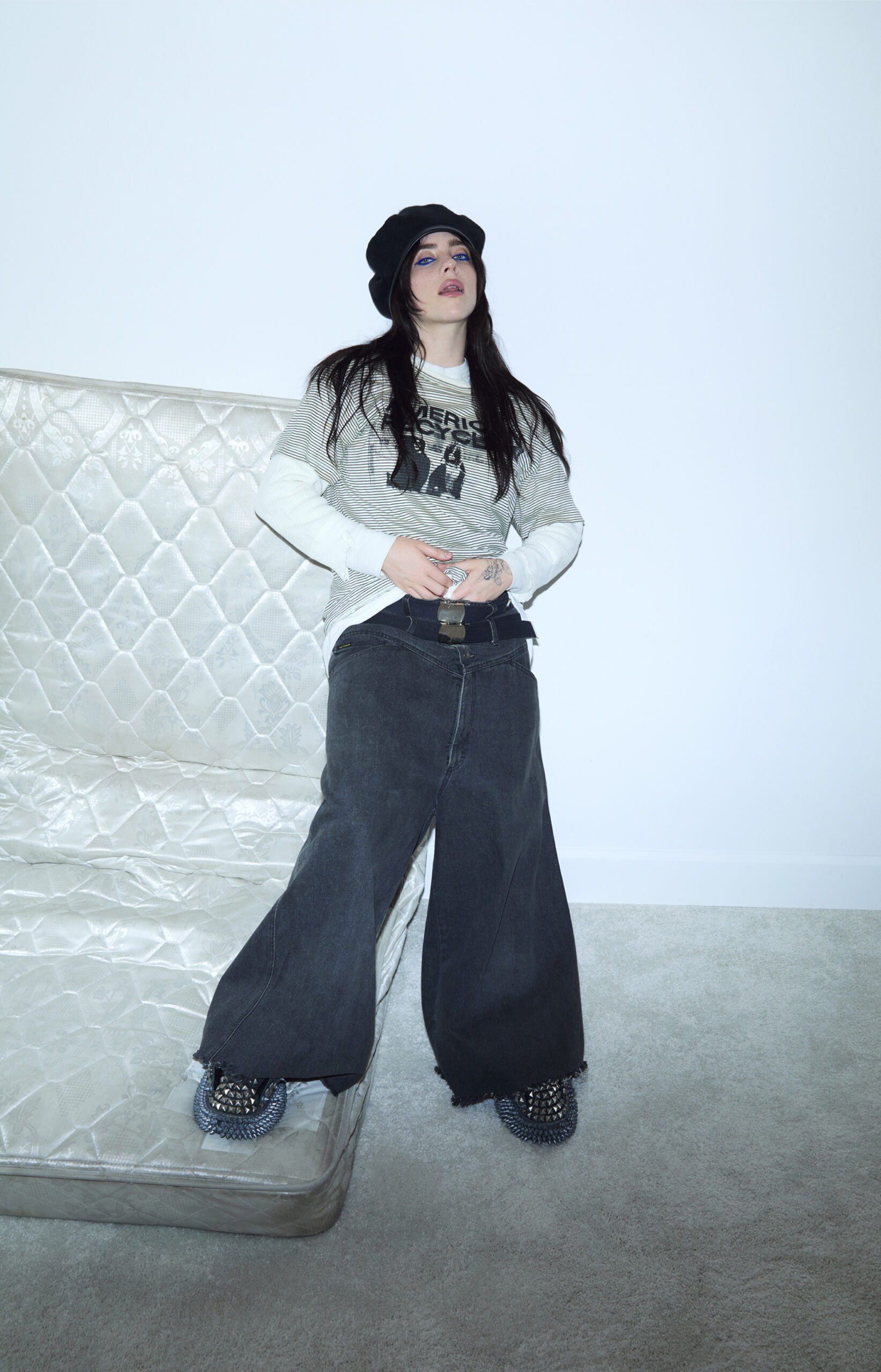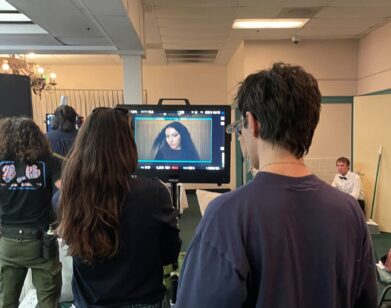COVER
“You Did This to Me”: Billie Eilish by Lana Del Rey
Lana Del Rey graced our cover last year to promote her album Did You Know That There’s a Tunnel Under Ocean Blvd and Billie Eilish conducted the interview. Now with Billie poised to dominate pop girl summer with her new album, Hit Me Hard and Soft, we got Lana back to return the favor.
———
WEDNESDAY 4:15 PM May 1, 2024 LA
LANA DEL REY: Hola, how is she?
BILLIE EILISH: She’s good!
DEL REY: Also, you don’t have to stay on camera. I was just saying hi.
EILISH: I’m happy to do whatever. I like seeing your face.
DEL REY: Okay, cool, cool, cool. Are you home?
EILISH: I’m home. I was just lying in the sun for a while, soaking it up.
DEL REY: That’s all I want to do. However, I needed to focus. And I’m sorry for everyone who’s listening on this call right now, because at some point, I’m going to get it together, but, like, not yet.
EILISH: [Laughs]
DEL REY: Okay. I’m going to say the one thing that I can actually formulate into a sentence.
EILISH: [Laughs] You’re so cute. Little nervous girl.
DEL REY: No, bitch. [Laughs] Okay, so your third track, “Chihiro,” I looked it up, it’s the character’s name from Spirited Away and in Japanese it means “a thousand questions.” But when I listened to the album, I wasn’t left with a thousand questions. I got most of who you are through it, and the only pieces that I didn’t get are what you’re going to tell me, what you’re still figuring out. So, let’s talk about “Skinny.” [Laughs]
EILISH: Okay. Well first of all, thank you for taking the time to listen to it at all and agreeing to do this interview. You know how much I love you and how much talking to you means to me. I’m just happy that I get to see your face.
DEL REY: Same. Also there’s so many things we could say about Coachella. Because not only did you come play with me, but you showed up to rehearsal the night before, which is crazy because it’s a lot of work, and a lot of time.
EILISH: Mm-hmm.
DEL REY: You know how I felt when I was up there on those tresses. I was like, “Help,” and you’re like, “You don’t need it.” And that’s why I’m laughing when I get on the phone, because your album sounds like you to me. You’re bossy, you’re sassy, but you’re also not. I’m sure you have questions, but you also have just as many answers.
EILISH: [Laughs]
DEL REY: This album had me smiling the whole time. I was like, “Yep, there she is again.” There were only two things that surprised me. One was a song called “The Greatest,” because I was like, “That doesn’t fit with what we’re talking about here.” I was like, “Who is that?” And then in “Skinny,” when you were like, “I’ve always loved you.” I was like, “If someone had asked me, ‘Do you think anything would bother her?’ I’d be like, ‘Probably something, but I could not tell you what.’” So Billie Eilish does get hurt sometimes? What the hell?
EILISH: Right? It’s interesting to be a person who isn’t an outwardly sensitive complainer. A lot of moments on this album are about situations where I was like, “I’d rather be tortured inside but have somebody think that I’m cool, than have somebody think that I’m hysterical and actually express my feelings.” So many songs on this album reflect that realization of, like, “Maybe I’m obsessed with the idea of nonchalance.”
DEL REY: Oh, that’s interesting.
EILISH: I would rather suffer in silence than tell you something’s bothering me and have you think I’m sensitive.
DEL REY: [Laughs] You are reminding me of an ex-boyfriend of mine, the funniest person I know. Years down the line I was like, “I thought you were nonchalant.” And he was like, “I am, but I’m definitely not.”
EILISH: [Laughs]
DEL REY: I never pictured you needing to keep it together. I picture myself needing to keep it together at certain points.
EILISH: [Laughs] I come off as a person that doesn’t care. I care about people and I have love and passion, but in relationships, I found myself never ever expressing any of my needs. It was interesting to notice I was doing that, and that’s what these lyrics are about. It’s almost like I resent myself for not advocating for myself, because maybe if I had, things would’ve changed. But I’ve always had an issue with weakness.
DEL REY: It’s not a phrase you commonly hear a younger woman say, so I love that. It kind of changes everything for me, in terms of you. All I can say is, if I’ve learned anything this year, it’s that everything happens when it should. Because when I look back at a lot of things, in retrospect I’m like, “I can see why I didn’t address that at first. That makes sense.”
EILISH: Right.
DEL REY: One thing I like on the album is how you launch. I was like, “‘Skinny,’ that song damn near broke my heart.” But then you launch right into “Lunch.” That was on purpose.
EILISH: [Laughs] I know.
DEL REY: I was like, “Oh, we’re back.”
EILISH: It, like, slaps you.
DEL REY: Ohhh, I just got it, the title of the album. Thinking about “Skinny” going into “Lunch,” that sums up the vibe of the title perfectly, because it’s kind of like, cool them down and then heat them up.
EILISH: That was very purposeful. It’s hard and soft and hard and soft. There’s motifs and melodies that repeat and lyrics that call back to other songs. The songs morph into each other. It was purposeful to have “Skinny” do what it does, and then at the end you hear the drums for “Lunch.” And then “Lunch” comes in and slaps you in the face.
DEL REY: And then towards the end, you get the same types of strings that were used on “Skinny.” We’re brought to that more vulnerable place.
EILISH: Mm-hmm.
DEL REY: I have questions about “Chihiro,” but in some ways, you answered them for me with the production. There were certain songs that almost had a world music vibe. I couldn’t find a word to describe it. I didn’t know if they were drums, I didn’t know if they were synths, but there were these recurring production choices. And I loved when a couple songs in a row lined up together, when each track would vibe right off the next one. But then you’d get hit with another surprise track. Do you think people—
EILISH: Wait, I want to hear what your questions were for “Chihiro,” and what was answered through the production. That’s so interesting to me.
DEL REY: So I didn’t have questions in “Chihiro.” I had questions after I looked up the definition of it.
EILISH: Right.
DEL REY: And then, I looked up a little scene from the movie, when Chihiro becomes happier because their name gets changed to Sen. So I looked up what Sen meant, and it also means “one thousand.” So the name went from “a thousand questions” to “a thousand,” which I thought was beautiful. It’s very poignant to be able to change but stay the same at the root, especially if the root is so naturally inquisitive and talented. It’s the best thing somebody can hope for as a musician. Because for me, the album was obviously different, the content was different, the production was a little different, but it was still so you.
EILISH: Mm-hmm.
DEL REY: Are you wondering what people are going to say about the song “Lunch”?
EILISH: [Laughs] I’m pretty aware of what people will say. It’s so weird to grow up and change in front of the world. The craziest part is discovering things about myself and then suddenly, everyone else knows, and I don’t even have a second to think about how it makes me feel.
DEL REY: That’s hard.
EILISH: It’s very frustrating.
DEL REY: The one good part I can tell you is that some of the things I heard said about me, I was able to use to my advantage later. Some of that information was useful, but the majority of it was not.
EILISH: [Laughs]
DEL REY: I almost feel like I grew up in front of the world too, because it doesn’t matter when you get famous, you’re going to grow up all over again. It’s a rebirth of sorts.
EILISH: It really is.
DEL REY: I guess in my case, perhaps more of an execution. But you are quite literally growing up in front of the world. I feel like the nonchalance we talked about, you don’t need that for a song like “Lunch.” The culture’s very warm right now.
EILISH: I’m lucky that we’re in a period of time that is so much more welcoming in a lot of ways. It’s still a big deal, but it’s not. The thing that’s been frustrating and gives me a lot of anxiety is the feeling of needing to explain myself all the time.
DEL REY: Exactly. How can I even ask you, “What’s ‘Lunch’ about?” And by the way, god help the people who do, because I feel sorry for them.
EILISH: No, it’s true. There’s so many difficult parts about fame, but one of the most frustrating things is that you can’t defend or explain yourself. I’m like, “Dude, imagine everyone in the world heard a rumor about you and it’s either not true or it’s explained out of context.” And my want and need to explain myself, I have found to be extremely damaging to my life and my sense of self.

Vintage T-shirt and Pants Raf Simons from David Casavant Archive. Long-Sleeve Shirt Cherry Vintage. Hat Sarah Sokol. Shoes ERL.
DEL REY: Yes.
EILISH: Every time I’ve gotten past the point of frustration and end up explaining myself, it’s only gotten worse. That caused me to prematurely state things that I don’t even feel confident or comfortable knowing about myself. And suddenly, I’m saying them publicly, and everyone’s like, “Oh, that’s who she is.” And I’m like, “You are making me feel like I am not allowed to grow and change.” It’s so fucking scary, because everything is written in stone.
DEL REY: That’s 100 percent true. But in the words of your last text, whatever you say is going to be perfect. I can tell you, it actually does apply to the public, too. Because there was a period of 10 years where I didn’t defend myself, didn’t say anything, and then I started telling my
story. “No, we didn’t have money.” And it was instant, horrific backlash. There’s that saying, “What hill do you want to die on?” And I was like, “This hill, bitch. I’m going to die on the money hill.” And then I got in so much trouble just for writing a song about me watching my boyfriend playing video games that I felt sequestered into wearing a turtleneck for 11 years. But just because our stories are written in the stars doesn’t mean they are set in stone. If I want to go back and say something completely different than I did a few years ago, I can tell you with the utmost confidence I will do that and risk what people are going to say. The only thing is that I have to stay out of all the results.
EILISH: Mm-hmm.
DEL REY: Okay. So cute little question for you. We talked about the name meaning “a thousand questions,” but after hearing the rest of the album, you have questions for people. Like in “Wildflower,” you’re like, “Things are good, right? You’re not thinking of her, right?” I was wondering, when one of your romantic relationships ends, do you think you leave them with a thousand questions? Or do they leave you with a thousand questions? Or is it split 50-50? Is it more dangerous to fall in love with you? Or is it more dangerous for you to fall in love?
EILISH: Big question, Lana.
DEL REY: Sound-bite!
EILISH: [Laughs] Such a sound-bite.
DEL REY: Cover story blurb alert!
EILISH: That’s a good one. I think that—
DEL REY: It’s got to be 50-50. That’s my guess, if I had to put money on it. I’m wagering, I’m interrupting, I’m giving it a 50-50.
EILISH: [Laughs] You think it’s a 50-50? I—
DEL REY: I definitely think it’s 50-50 after “Wildflower” and—what’s the fucking bossy one? Is it “Birds of a Feather”? Yeah. “You say you want to quit, don’t be stupid, you’re deluded.” I was like, “God. This has to be a 50-50 situation. She could either”—okay, go ahead.
EILISH: [Laughs] I don’t even know. I think 50-50 is probably accurate. I literally hate who I am so much when I’m in love.
DEL REY: That’s the most masculine thing you’ve ever said. Facts.
EILISH: It’s true.
DEL REY: I’m asking for a retraction on my last statement. Go ahead.
EILISH: I really don’t like being—I was going to say out of control, but there’s ways that I do like being out of control. I have a power issue and a control issue, and I also don’t like being vulnerable in a romantic way. It makes me feel uncomfortable, and I don’t know how many times I’ve really been in love. I think there’s different versions of love, and I think that you can be in love and it might not be deep. I’m not going to get too in detail, because I’m going to be rude, but I’ve never been dumped, and also, I’ve never been broken up with. I’ve only done the breaking up.
DEL REY: That’s actually not that rude, though. Because that could also come from you running, right?
EILISH: For sure. And I think when people hear that, they’re like, “Oh, all you do is break hearts.” Sure, but that doesn’t mean that people are totally innocent. It means that I was like, “Oh, let me get the fuck out of here.” Or it means things just weren’t right.
DEL REY: You get enough intel, and you’re like, “I really don’t want to, but I’m out.”
EILISH: That’s usually what it is for me. It’s just like—
DEL REY: Usually, I tell people that they broke up with me, because essentially, they did. Because they made me do that.
EILISH: Right? That’s what I’m saying. “You did this, bitch.” [Laughs] Now some of y’all about to be real mad at me, but I do believe that breaking up with someone versus being broken up with—obviously being broken up with hurts like hell, especially when you don’t see it coming and you wanted a future and it’s taken out of your hands. But honestly, the pain of knowing that you have to end something with somebody that you genuinely love is so horrible.
DEL REY: It stays with you longer.
EILISH: I think so, too. And you don’t get to even have the, like, “I got dumped, so fuck you guys. I get to go crazy and have a reaction and be mad at you. And I get to make you into an enemy, because you broke up with me.” You can’t do that. You can’t become a victim.
DEL REY: No, actually, you don’t get to get mad.
EILISH: It’s really sad.
DEL REY: That gives me even more context into so much of your early music and a lot of this record. And also your writing approach too, because it’s not like it lends itself to hesitancy. It’s not even painting something dark sonically, but it’s a little bit blue. You actually use the word “blue” a lot in this album.
EILISH: I love that you just pointed that out, and it’s making me think about how I don’t love to point fingers. Sometimes you want to, because you’re mad and you want people to feel for you and you want to feel seen. But I’m not going, “You did this to me.” It’s more, like, “We’re all allowed to feel however we feel based on whatever happened.” Also, it’s not about pointing my finger and blaming people: “And everybody, attack this person, because they hurt me.” It’s like, “I hurt me. And I have hurt me multiple times, and I allow other people to get to that point.” And that’s where I’m trying to draw the boundaries and protect my shadow.
DEL REY: As you should. And it’s because you didn’t point fingers that people will have a thousand questions. To go back to ever being in love, the only things that are real are feelings.
EILISH: I just had an experience the other day. I had some people over, and there was something happening that involved a lot of sensation and feeling and being in your body. And the person who is guiding me through this thing—I won’t even get into it, because it’s irrelevant to what I’m saying—there was this moment where they were talking about communication and saying, “Just remember to be aware of how you feel.” And I remember saying, “Oh, well, this is making me think of this, and I am feeling this.” I kept describing things. And he said to me, “I appreciate your psychoanalysis of what you’re feeling, but I don’t need you to analyze it. I just need you to feel it.” And that got to me. It made me think. It made me feel.
DEL REY: I love that. It’s really the scariest thing of all. But for overthinkers, it can be a good practice to just feel and then move by those emotions. So yeah, we don’t need to end with a question, because I think the gift of being with you—whether you’re present or nonchalant or considering whether you’re being nonchalant in this moment—is that your instant impact on a room, even if you don’t say anything, makes people feel a lot. Even my band told me that. When you walked out, they were like, “Damn, she’s good. She makes you feel a lot.” And I was like, “Try sitting next to her when she’s looking into your eyes. It’s crazy.”
EILISH: [Laughs]
DEL REY: So I know you got to go, but I love this album. I’m very stoked for you. And also, I love the title, and the titles for all of your songs.
EILISH: I knew you would.
DEL REY: I love your Japanese references. I can see you in all of your titles and in all of your words. Obsessed.
EILISH: Love you so much. Thank you, Lana.
DEL REY: You’re the bomb.
————
Hair: Benjamin Mohapi at Benjamin Salon.
Makeup: Emily Cheng.
Nails: Erin Moffett at Art Department.
Set Design: Health Mattioli at Frank Reps.
Tailor: Lydia Jakubowski.
Digital Technician: Benoist Lechevallier.
Photography Assistants: Mike Lopez and Josh Deangelis.















